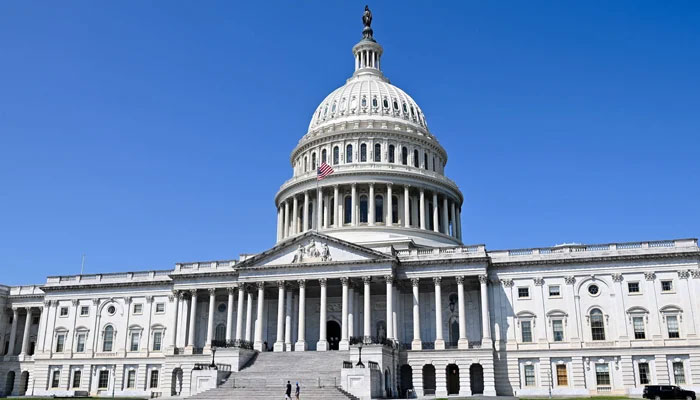Electoral rigging complaints are 200 years old
Fingers were also pointed at 1876, 1888, 1960, 2000, 2004, 2016 and 2020 US presidential elections and hue and cry was raised over the 1957 and 2011 Canadian polls
LAHORE: Electoral rigging allegations, both pre-poll and post-poll, have been surfacing globally for at least 200 years and ballot exercises have been dubbed controversial since 1824 when John Quincy Adams became American President despite the fact that his opponent, Andrew Jackson, had won a plurality of the popular and electoral vote, research shows.
Fingers were also pointed at the 1876, 1888, 1960, 2000, 2004, 2016 and 2020 US presidential elections, and hue and cry was raised over the 1957 and 2011 Canadian polls.
The United Kingdom has generally had low levels of proven electoral fraud. For example, there was little or no evidence of large-scale electoral fraud in 2022.
Most cases (93%) resulted in the police taking no further action or were locally resolved through words of advice to those involved.
Unlike Pakistan, the situation is relatively commendable in India, world’s largest democracy, where there are over 912 million registered voters and the turnout was 67 per cent during the last ballot exercise. However, the “Economic Times” writes: “During the pre-Electronic Voting Machine (EVM) days, election rigging in India used to be as common as the elections themselves.
There have been complaints of rigging, manipulation, gun-point voting, Gerrymandering, stuffing of ballot boxes in pre-EVM times and vote-buying etc in India, but somehow, the losing parties have always accepted defeat gracefully.
Here follows a list of countries where voters and losing parties have vociferously termed their electoral exercises as being rigged and largely manipulated:
Argentine (1931, 1937), Brazil (2014), Venezuela (2013, 2017), Bolivia (2019), Bulgaria (1946, 2013), Poland (1946), Hungary (1947, 2014), Romania (1946, 2004, 2014), Portugal (1958), Greece (1961), Serbia (1992, 1997), Russia (1996, 2007, 2011, 2012), Yugoslavia (2000), Georgia (2003), Ukraine (2004, 2012, 2014), Belarus (2006, 2015), Italy (2006), Austria (2016), Iran (2009, 2021), Iraq (2010, 2014), Jordan (2013), Mexico (1988), South Korea (1960), Philippines (1986, 2004, 2007), Malaysia (2013), Turkey (2014), Hong Kong (2016, 2018, 2021), Indonesia (2017, 2019), Singapore (2017), Myanmar (1990, 2010, 2012, 2015, 2020), Tajikistan (1994, 1999, 2006), Kazakhstan (1995, 1999, 2004, 2005, 2007, 2011, 2012, 2015, 2016, 2019), Armenia (1995, 1996, 1998, 2003, 2008, 2012), Bangladesh (1996, 2014, 2018), Sri Lanka (2000), Azerbaijan (2003, 2015), Taiwan (2004), Thailand (2006, 2011, 2014, 2019), Turkmenistan (2007, 2012), Uzbekistan (2007, 2015), Afghanistan (2009, 2014), Syria (2012, 2021), Algeria (1991, 2009, 2014), Angola (1991), Chad (1996, 2021), Cameroon (1997, 2011, 2018), Rwanda (2003, 2017), Ethiopia and Egypt (2005), Uganda (2006, 2011, 2016, 2021), Nigeria and Kenya (2007), Zimbabwe (2008, 2013), Equatorial Guinea (2009, 2013, 2016), Rwanda, Ethiopia and Ivory Coast (2010), Mauritius (2013), Libya (2014), Malawi, Mauritania and South Africa (2014), Zambia, Sudan, Togo, Ethiopia, Burundi and Tanzania (2015), Congo (2018), Honduras (2013), Nicaragua (20210) and Guatemala (2023) etc.
Some 18 years ago, the “Journal of Democracy,” one of the world’s leading publications on the theory and practice of democracy, had stated: “Authoritarian regimes around the world hold elections, and manipulate them every step of the way. While electoral fraud and manipulation take a variety of forms, increasingly sophisticated methods are often employed before polling stations even open.
Authoritarian regimes usually get away with rigging elections, but exposure of electoral fraud and manipulation erodes the legitimacy that authoritarian regimes seek to gain through the electoral process. In a few cases where attempts to rig elections were effectively documented, election observers dealt a heavy—if not decisive—blow to the legitimacy of authoritarian regimes.”
-
 Pete Davidson’s Girlfriend Elsie Hewitt Says 'everything Hurts' After Sudden Medical Emergency
Pete Davidson’s Girlfriend Elsie Hewitt Says 'everything Hurts' After Sudden Medical Emergency -
 Princess Beatrice 17 Holidays Per Year Exposed Amid Andrew Arrest
Princess Beatrice 17 Holidays Per Year Exposed Amid Andrew Arrest -
 Who Is 'Queen Of Woke'? UK First Female Civil Head
Who Is 'Queen Of Woke'? UK First Female Civil Head -
 Dwayne Johnson Confesses What Secretly Scares Him More Than Fame
Dwayne Johnson Confesses What Secretly Scares Him More Than Fame -
 Elizabeth Hurley's Son Damian Breaks Silence On Mom’s Romance With Billy Ray Cyrus
Elizabeth Hurley's Son Damian Breaks Silence On Mom’s Romance With Billy Ray Cyrus -
 Shamed Andrew Should Be Happy ‘he Is Only In For Sharing Information’
Shamed Andrew Should Be Happy ‘he Is Only In For Sharing Information’ -
 Daniel Radcliffe Wants Son To See Him As Just Dad, Not Harry Potter
Daniel Radcliffe Wants Son To See Him As Just Dad, Not Harry Potter -
 Apple Sued Over 'child Sexual Abuse' Material Stored Or Shared On ICloud
Apple Sued Over 'child Sexual Abuse' Material Stored Or Shared On ICloud -
 Nancy Guthrie Kidnapped With 'blessings' Of Drug Cartels
Nancy Guthrie Kidnapped With 'blessings' Of Drug Cartels -
 Hailey Bieber Reveals Justin Bieber's Hit Song Baby Jack Is Already Singing
Hailey Bieber Reveals Justin Bieber's Hit Song Baby Jack Is Already Singing -
 Emily Ratajkowski Appears To Confirm Romance With Dua Lipa's Ex Romain Gavras
Emily Ratajkowski Appears To Confirm Romance With Dua Lipa's Ex Romain Gavras -
 Leighton Meester Breaks Silence On Viral Ariana Grande Interaction On Critics Choice Awards
Leighton Meester Breaks Silence On Viral Ariana Grande Interaction On Critics Choice Awards -
 Heavy Snowfall Disrupts Operations At Germany's Largest Airport
Heavy Snowfall Disrupts Operations At Germany's Largest Airport -
 Andrew Mountbatten Windsor Released Hours After Police Arrest
Andrew Mountbatten Windsor Released Hours After Police Arrest -
 Heidi Klum Eyes Spooky Season Anthem With Diplo After Being Dubbed 'Queen Of Halloween'
Heidi Klum Eyes Spooky Season Anthem With Diplo After Being Dubbed 'Queen Of Halloween' -
 King Charles Is In ‘unchartered Waters’ As Andrew Takes Family Down
King Charles Is In ‘unchartered Waters’ As Andrew Takes Family Down




